2024 Centre County Reads Programming Strikes a Chord with the Community
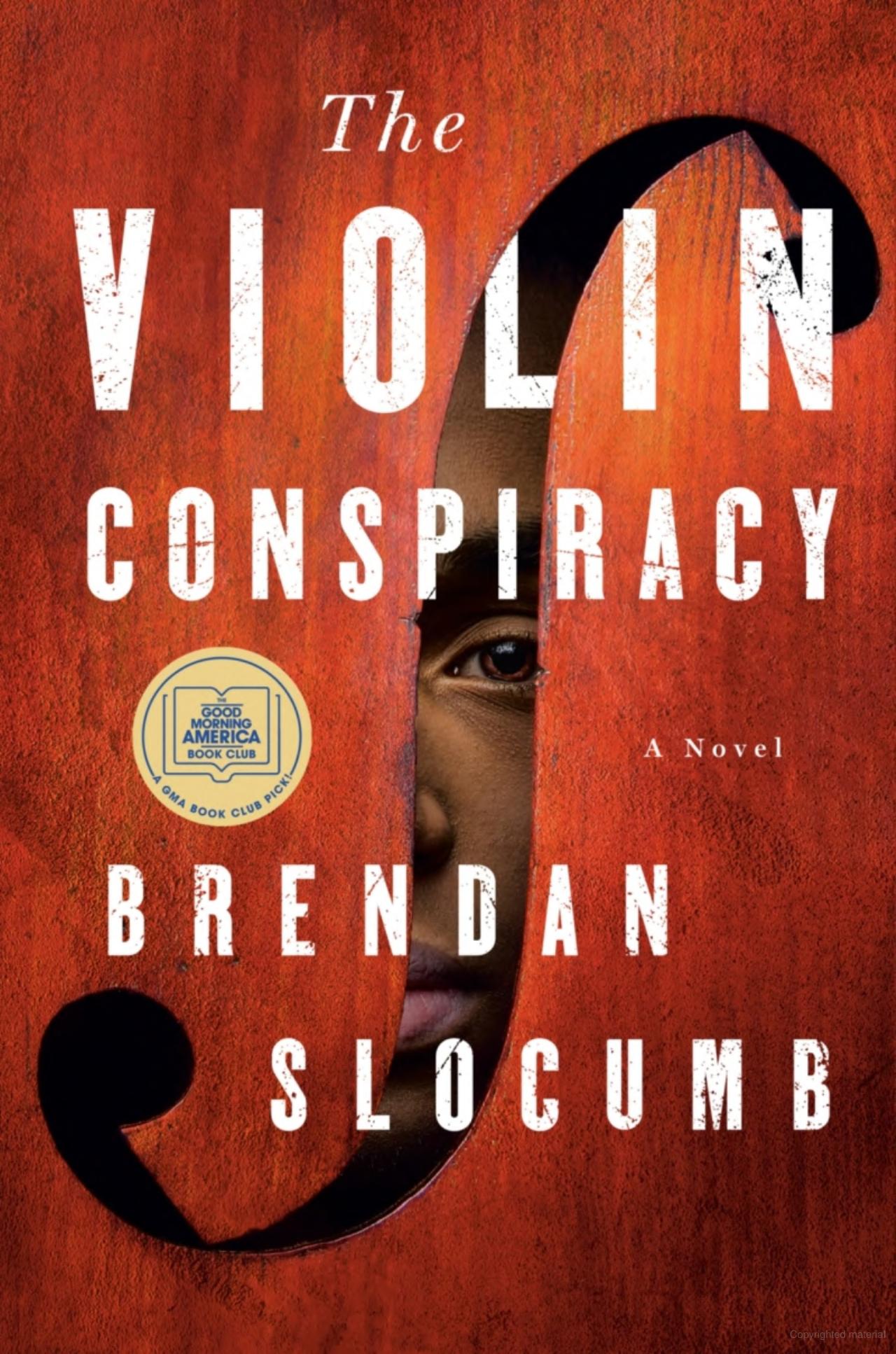
This winter, local readers kept cozy with Brendan Slocumb’s The Violin Conspiracy, a mystery novel exploring questions of art, race, and ambition. The Violin Conspiracy follows a young Black musician named Ray McMillian just beginning his career as a violin soloist. As Ray learns that his family heirloom violin is actually a rare Stradivarius, he experiences a myriad of new challenges, from the pressure of performing with such a coveted instrument to the stress of fighting legal battles over true ownership of the violin. When the Stradivarius is suddenly stolen and held for ransom just before the international Tchaikovsky music competition, Ray faces his most difficult challenge yet: believing in himself and his virtuoso abilities.
CALS and the Centre County Library System offered a slate of free, community-oriented programming inspired by the novel and recapped below. The events included numerous community book discussions, the “Art of Growing Up” roundtable event, a community film talk, the “Lost and Found” writing contest, and an author visit from Brendan Slocumb.
Book Discussions

From January through March, the Centre County Library System held a number of book discussions, both in-person and hybrid, for The Violin Conspiracy. Participants delved into the nuanced themes of race, identity, and family ties as depicted in Slocumb's novel. They considered the struggles faced by Ray, a Black violinist, in the traditionally white world of classical music. Despite these systemic barriers, Ray wields music as a powerful tool of self-expression, allowing him to navigate and transcend adversity.
Of particular interest was Ray's journey of self-discovery, intertwined with his exploration of his family history. Participants noted parallels between his development as a musician and his growth as an individual; understanding his family history—including the true story about the priceless violin of his enslaved great-great-great grandfather that Ray ultimately inherits—solidified Ray’s confidence as both musician and man.
Central to the discussion was the novel's portrayal of intergenerational relationships, particularly Ray's bond with his grandmother, who fosters Ray’s love of music and gifts him the family heirloom Stradivarius violin. Participants observed that Ray's violin symbolized this bond, underscoring the importance of family ties in shaping one's identity and artistic pursuits. Overall, readers found The Violin Conspiracy to be a poignant exploration of race, music, and personal identity, responding favorably to its themes of resilience and the enduring influence of family ties.
"The Art of Growing Up" Roundtable
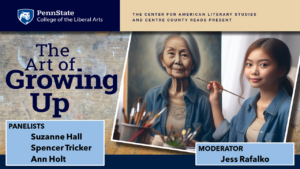 On Wednesday, Feb. 28 CALS hosted the virtual roundtable event “The Art of Growing Up.” Three invited panelists discussed the intersection of art and identity, and the power of music and literature to shape personal narratives and cultural understanding. Suzanne Hall, Associate Professor of Music Education at Temple University, highlighted the role of music in personal development, citing examples from her own life and her students’ experiences. Spencer Tricker, Assistant Professor of English at Clark University, explored the coming-of-age genre and its depiction of the ongoing, often messy process of self-discovery. Ann Holt, Assistant Professor of Art Education at Penn State, called for greater recognition—and love, support, and protection—for marginalized young people in and through the arts.
On Wednesday, Feb. 28 CALS hosted the virtual roundtable event “The Art of Growing Up.” Three invited panelists discussed the intersection of art and identity, and the power of music and literature to shape personal narratives and cultural understanding. Suzanne Hall, Associate Professor of Music Education at Temple University, highlighted the role of music in personal development, citing examples from her own life and her students’ experiences. Spencer Tricker, Assistant Professor of English at Clark University, explored the coming-of-age genre and its depiction of the ongoing, often messy process of self-discovery. Ann Holt, Assistant Professor of Art Education at Penn State, called for greater recognition—and love, support, and protection—for marginalized young people in and through the arts.
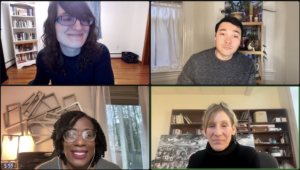
The speakers emphasized the transformative power of art, which helps individuals and communities imagine and create new realities. Hall stated that “music has helped me through some of the most challenging times in my life… inspiring me to face the challenges of difficult days.” They suggested as well the need to balance the joyful and reflective aspects of art, noting that artistic practice can sometimes be an all-consuming passion that stunts personal development.
The discussion also addressed the powerful role the arts play in fostering relatability in the classroom, with panelists describing how they encourage students to share their stories and experiences to create an inclusive and validating environment. They highlighted the importance of recognizing and affirming diverse perspectives and experiences. Tricker noted that coming-of-age “literature by minority ethnic writers helps us understand that everyone's story is different, with different rhythms, challenges, triumphs, indignities, things that when we read about them temporarily become ours to deeply consider as well.”
Overall, the event showcased the transformative potential of art in healing, community building, and social change. In Holt’s insightful words: “Art is a universal language that connects people across time and space. It's what makes us human. It makes us able to communicate, empathize, and understand one another.”
The Soloist Film Talk and Writing Contest
 This year’s Centre Country Reads programming offered additional avenues for community members to explore the novel’s themes of artistic expression, personal history, and family heirlooms. The Centre County Library hosted a viewing and discussion of the 2009 film The Soloist, a biopic of Nathaniel Ayers, a talented Black musician who struggles with mental illness and homelessness yet still maintains his deep connection to music. Participants in the film talk discussed the thematic connections between The Soloist and The Violin Conspiracy. The discussion centered around the effectiveness of music as a form of expression, particularly for those with mental health issues.
This year’s Centre Country Reads programming offered additional avenues for community members to explore the novel’s themes of artistic expression, personal history, and family heirlooms. The Centre County Library hosted a viewing and discussion of the 2009 film The Soloist, a biopic of Nathaniel Ayers, a talented Black musician who struggles with mental illness and homelessness yet still maintains his deep connection to music. Participants in the film talk discussed the thematic connections between The Soloist and The Violin Conspiracy. The discussion centered around the effectiveness of music as a form of expression, particularly for those with mental health issues.
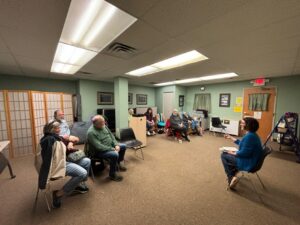
Additionally, the group considered the economic barriers faced by many musicians, drawing parallels between Ray's struggle to make a living as a performer and Nathaniel's fear of having his instrument stolen while homeless. These examples underscored the challenges that Black musicians often face in pursuing their art and the importance of addressing systemic issues of inequality within the classical music industry.
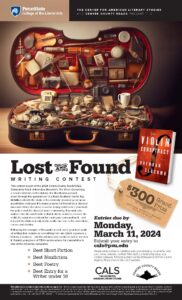 CALS also hosted a “Lost and Found” writing contest inspired by the novel’s dual mysteries: the theft of Ray’s violin, and the true provenance of his priceless Stadivarius. A record number of entrants to this year’s writing contest submitted pieces of fiction, non-fiction, and poetry that “center[ed] on something lost—an object, a person, a history, a memory—and the attempt (successful or not) to recover it.” Winning entries can be read online here.
CALS also hosted a “Lost and Found” writing contest inspired by the novel’s dual mysteries: the theft of Ray’s violin, and the true provenance of his priceless Stadivarius. A record number of entrants to this year’s writing contest submitted pieces of fiction, non-fiction, and poetry that “center[ed] on something lost—an object, a person, a history, a memory—and the attempt (successful or not) to recover it.” Winning entries can be read online here.
Brendan Slocumb Author Visit

This year’s programming culminated with a virtual author visit by Brendan Slocumb on Wednesday, March 20, in which he answered the local community’s questions and considered their takes on the novel. Perhaps the most surprising detail that emerged during the discussion was the timeline under which Slocumb wrote his novel, which was completed “in only two months” during the COVID-19 pandemic. Although he wrote the novel with lightning speed, he admitted that he had to scale down “some of the technical language,” as his original draft included many “detail[s] only interesting to musicians.” Slocumb is currently in the process of writing his third novel (having published a second, Symphony of Secrets, in 2023).
Slocumb also discussed his own experience with racial bias in the music industry, suggesting he has faced many of the same prejudices that Ray does in the novel. Slocumb revealed that “90% of the novel is based on [his] life,” reflecting on his own experience discovering the violin. “The violin is my instrument” Slocumb explained. He began playing music in school around the age of nine “as a way to get out of class.” Laughing at his admission, Slocumb reflected on the way that music “saved [him]” as a kid, inspiring a genuine passion while also “keeping [him] out of trouble.”
Slocumb, a music teacher himself, then gave advice about the importance of mentorship for young artists. To adolescents from households like Ray’s which may not support their musical endeavors, Slocumb admitted that “not everyone will understand” their passion for music, but the important part is to just “keep playing.”
Slocumb's personal insights into his novel's genesis and reflections on his own experiences enriched the themes and messages conveyed in his work, creating a deeper appreciation for the transformative potential of music and art in navigating life's challenges and fostering personal growth.
It’s no conspiracy: The Violin Conspiracy captivated the Centre County community, entertaining readers while also prompting reflection on questions about where we come from, who we are, and where we dare to let our talents and passions take us.

This winter, local readers kept cozy with Brendan Slocumb’s The Violin Conspiracy, a mystery novel exploring questions of art, race, and ambition. The Violin Conspiracy follows a young Black musician named Ray McMillian just beginning his career as a violin soloist. As Ray learns that his family heirloom violin is actually a rare Stradivarius, he experiences a myriad of new challenges, from the pressure of performing with such a coveted instrument to the stress of fighting legal battles over true ownership of the violin. When the Stradivarius is suddenly stolen and held for ransom just before the international Tchaikovsky music competition, Ray faces his most difficult challenge yet: believing in himself and his virtuoso abilities.
CALS and the Centre County Library System offered a slate of free, community-oriented programming inspired by the novel and recapped below. The events included numerous community book discussions, the “Art of Growing Up” roundtable event, a community film talk, the “Lost and Found” writing contest, and an author visit from Brendan Slocumb.
Book Discussions

From January through March, the Centre County Library System held a number of book discussions, both in-person and hybrid, for The Violin Conspiracy. Participants delved into the nuanced themes of race, identity, and family ties as depicted in Slocumb's novel. They considered the struggles faced by Ray, a Black violinist, in the traditionally white world of classical music. Despite these systemic barriers, Ray wields music as a powerful tool of self-expression, allowing him to navigate and transcend adversity.
Of particular interest was Ray's journey of self-discovery, intertwined with his exploration of his family history. Participants noted parallels between his development as a musician and his growth as an individual; understanding his family history—including the true story about the priceless violin of his enslaved great-great-great grandfather that Ray ultimately inherits—solidified Ray’s confidence as both musician and man.
Central to the discussion was the novel's portrayal of intergenerational relationships, particularly Ray's bond with his grandmother, who fosters Ray’s love of music and gifts him the family heirloom Stradivarius violin. Participants observed that Ray's violin symbolized this bond, underscoring the importance of family ties in shaping one's identity and artistic pursuits. Overall, readers found The Violin Conspiracy to be a poignant exploration of race, music, and personal identity, responding favorably to its themes of resilience and the enduring influence of family ties.
"The Art of Growing Up" Roundtable
 On Wednesday, Feb. 28 CALS hosted the virtual roundtable event “The Art of Growing Up.” Three invited panelists discussed the intersection of art and identity, and the power of music and literature to shape personal narratives and cultural understanding. Suzanne Hall, Associate Professor of Music Education at Temple University, highlighted the role of music in personal development, citing examples from her own life and her students’ experiences. Spencer Tricker, Assistant Professor of English at Clark University, explored the coming-of-age genre and its depiction of the ongoing, often messy process of self-discovery. Ann Holt, Assistant Professor of Art Education at Penn State, called for greater recognition—and love, support, and protection—for marginalized young people in and through the arts.
On Wednesday, Feb. 28 CALS hosted the virtual roundtable event “The Art of Growing Up.” Three invited panelists discussed the intersection of art and identity, and the power of music and literature to shape personal narratives and cultural understanding. Suzanne Hall, Associate Professor of Music Education at Temple University, highlighted the role of music in personal development, citing examples from her own life and her students’ experiences. Spencer Tricker, Assistant Professor of English at Clark University, explored the coming-of-age genre and its depiction of the ongoing, often messy process of self-discovery. Ann Holt, Assistant Professor of Art Education at Penn State, called for greater recognition—and love, support, and protection—for marginalized young people in and through the arts.

The speakers emphasized the transformative power of art, which helps individuals and communities imagine and create new realities. Hall stated that “music has helped me through some of the most challenging times in my life… inspiring me to face the challenges of difficult days.” They suggested as well the need to balance the joyful and reflective aspects of art, noting that artistic practice can sometimes be an all-consuming passion that stunts personal development.
The discussion also addressed the powerful role the arts play in fostering relatability in the classroom, with panelists describing how they encourage students to share their stories and experiences to create an inclusive and validating environment. They highlighted the importance of recognizing and affirming diverse perspectives and experiences. Tricker noted that coming-of-age “literature by minority ethnic writers helps us understand that everyone's story is different, with different rhythms, challenges, triumphs, indignities, things that when we read about them temporarily become ours to deeply consider as well.”
Overall, the event showcased the transformative potential of art in healing, community building, and social change. In Holt’s insightful words: “Art is a universal language that connects people across time and space. It's what makes us human. It makes us able to communicate, empathize, and understand one another.”
The Soloist Film Talk and Writing Contest
 This year’s Centre Country Reads programming offered additional avenues for community members to explore the novel’s themes of artistic expression, personal history, and family heirlooms. The Centre County Library hosted a viewing and discussion of the 2009 film The Soloist, a biopic of Nathaniel Ayers, a talented Black musician who struggles with mental illness and homelessness yet still maintains his deep connection to music. Participants in the film talk discussed the thematic connections between The Soloist and The Violin Conspiracy. The discussion centered around the effectiveness of music as a form of expression, particularly for those with mental health issues.
This year’s Centre Country Reads programming offered additional avenues for community members to explore the novel’s themes of artistic expression, personal history, and family heirlooms. The Centre County Library hosted a viewing and discussion of the 2009 film The Soloist, a biopic of Nathaniel Ayers, a talented Black musician who struggles with mental illness and homelessness yet still maintains his deep connection to music. Participants in the film talk discussed the thematic connections between The Soloist and The Violin Conspiracy. The discussion centered around the effectiveness of music as a form of expression, particularly for those with mental health issues.

Additionally, the group considered the economic barriers faced by many musicians, drawing parallels between Ray's struggle to make a living as a performer and Nathaniel's fear of having his instrument stolen while homeless. These examples underscored the challenges that Black musicians often face in pursuing their art and the importance of addressing systemic issues of inequality within the classical music industry.
 CALS also hosted a “Lost and Found” writing contest inspired by the novel’s dual mysteries: the theft of Ray’s violin, and the true provenance of his priceless Stadivarius. A record number of entrants to this year’s writing contest submitted pieces of fiction, non-fiction, and poetry that “center[ed] on something lost—an object, a person, a history, a memory—and the attempt (successful or not) to recover it.” Winning entries can be read online here.
CALS also hosted a “Lost and Found” writing contest inspired by the novel’s dual mysteries: the theft of Ray’s violin, and the true provenance of his priceless Stadivarius. A record number of entrants to this year’s writing contest submitted pieces of fiction, non-fiction, and poetry that “center[ed] on something lost—an object, a person, a history, a memory—and the attempt (successful or not) to recover it.” Winning entries can be read online here.
Brendan Slocumb Author Visit

This year’s programming culminated with a virtual author visit by Brendan Slocumb on Wednesday, March 20, in which he answered the local community’s questions and considered their takes on the novel. Perhaps the most surprising detail that emerged during the discussion was the timeline under which Slocumb wrote his novel, which was completed “in only two months” during the COVID-19 pandemic. Although he wrote the novel with lightning speed, he admitted that he had to scale down “some of the technical language,” as his original draft included many “detail[s] only interesting to musicians.” Slocumb is currently in the process of writing his third novel (having published a second, Symphony of Secrets, in 2023).
Slocumb also discussed his own experience with racial bias in the music industry, suggesting he has faced many of the same prejudices that Ray does in the novel. Slocumb revealed that “90% of the novel is based on [his] life,” reflecting on his own experience discovering the violin. “The violin is my instrument” Slocumb explained. He began playing music in school around the age of nine “as a way to get out of class.” Laughing at his admission, Slocumb reflected on the way that music “saved [him]” as a kid, inspiring a genuine passion while also “keeping [him] out of trouble.”
Slocumb, a music teacher himself, then gave advice about the importance of mentorship for young artists. To adolescents from households like Ray’s which may not support their musical endeavors, Slocumb admitted that “not everyone will understand” their passion for music, but the important part is to just “keep playing.”
Slocumb's personal insights into his novel's genesis and reflections on his own experiences enriched the themes and messages conveyed in his work, creating a deeper appreciation for the transformative potential of music and art in navigating life's challenges and fostering personal growth.
It’s no conspiracy: The Violin Conspiracy captivated the Centre County community, entertaining readers while also prompting reflection on questions about where we come from, who we are, and where we dare to let our talents and passions take us.